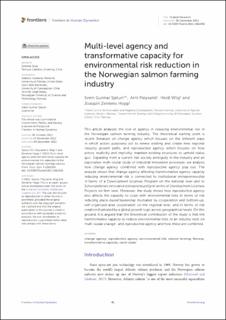Multi-level agency and transformative capacity for environmental risk reduction in the Norwegian salmon farming industry
Peer reviewed, Journal article
Published version

View/
Date
2022Metadata
Show full item recordCollections
- Scientific articles [2181]
Original version
10.3389/fhumd.2022.1062058Abstract
This article analyzes the role of agency in reducing environmental risk in the Norwegian salmon farming industry. The theoretical starting point is recent literature on change agency which focuses on the different ways in which actors purposely act to renew existing and create new regional industry growth paths, and reproductive agency which focuses on how actors, explicitly and implicitly, maintain existing structures to uphold status quo. Departing from a current risk society ambiguity in the industry and an explorative multi-scalar study of industrial innovation processes, we analysis how change agency combined with reproductive agency play out. The analysis shows that change agency affecting transformative agency capacity reducing environmental risk is connected to institutional entrepreneurship in terms of a Development Licenses Program on the national level and to Schumpeterian innovative entrepreneurship in terms of Development Licenses Projects on firm level. Moreover, the study shows how reproductive agency also affects the capacity to cope with environmental risks in terms of risk reducing place-based leadership illustrated by cooperation and bottom-up, self-organized area cooperation on the regional level, and in terms of risk creation illustrated by a global growth logic across geographical levels. On this ground, it is argued that the theoretical contribution of the study is that the transformative capacity to reduce environmental risks of an industry rests on multi-scalar change- and reproductive agency and how these are combined.
